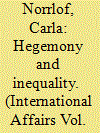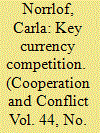|
|
|
Sort Order |
|
|
|
Items / Page
|
|
|
|
|
|
|
| Srl | Item |
| 1 |
ID:
159467


|
|
|
|
|
| Summary/Abstract |
A pivotal question raised in the 1980s debate over the durability of the United States-led world order still haunts us today. Does the postwar liberal international order, which the US was central in shaping, serve US interests? President Trump's answer is a resounding no, promising an ambitious redistributive programme to rebalance global wealth and power. Similar to political platforms in other advanced countries, Trump argues for a fundamental revision of the order, proposing a renewal of international principles to foster a global system tailored to US interests. The major theatres where this battle is being fought are the politics of security, trade and money. Prominent academics align on some aspects of this agenda. Instead, I contend that as the primary beneficiary of the liberal international order, the US will be its first casualty. While President Trump is right to identify the potential role redistribution could play in strengthening America's global leadership, he misidentifies the nature of the distribution problem. Internationally, ‘America First’ is premised on zero-sum logic and poses a risk to the liberal international order, to US security and prosperity. Domestically, ‘white America First’ promises to restore lost greatness to white Americans, aggravating economic and political inequality in the US. Drawing on presidential exit polls, other survey data, real income and income growth nationally and regionally, I explain the 2016 election outcome as a function of education and ethnicity, contextualized by income concerns and racism. Redistributive domestic policies, particularly expanding higher education, are necessary for US support of the liberal international order to endure.
|
|
|
|
|
|
|
|
|
|
|
|
|
|
|
|
| 2 |
ID:
092879


|
|
|
|
|
| Publication |
2009.
|
| Summary/Abstract |
In this article, I investigate whether the euro is set to eclipse the dollar as the world currency. Although the euro has gained in importance at the expense of the dollar in all key currency functions, I argue that it is not about to replace the dollar as the unique currency of global importance. Notwithstanding America's current weakness, I argue that different preferences for monetary and fiscal policy inside the euro-zone, and the need to coordinate these, will make it difficult to accommodate and correct large-scale imports over the long term. I also find that taking on the role of the world's preferred import destination is bound to exacerbate internal differences and complicate decision-making.
|
|
|
|
|
|
|
|
|
|
|
|
|
|
|
|
| 3 |
ID:
168920


|
|
|
|
|
| Summary/Abstract |
When and under what conditions does hegemony pay? The fate of any hegemonic order hinges on the answer to this question. Notwithstanding major relevant research traditions, international relations scholarship remains poorly equipped to answer it. We fill this gap with a theoretical framework for understanding the costs and benefits of hegemony that identifies the conditions that affect potential complementarity between military protection and economic production. We show how this relationship varies in different international systems in ways that confounded previous research. Contrary to widely held views in US domestic politics and in the security studies research community, we argue that under current conditions complementarity between protection and production means the maintenance of hegemonic order remains beneficial to the United States.
|
|
|
|
|
|
|
|
|
|
|
|
|
|
|
|
|
|
|
|
|